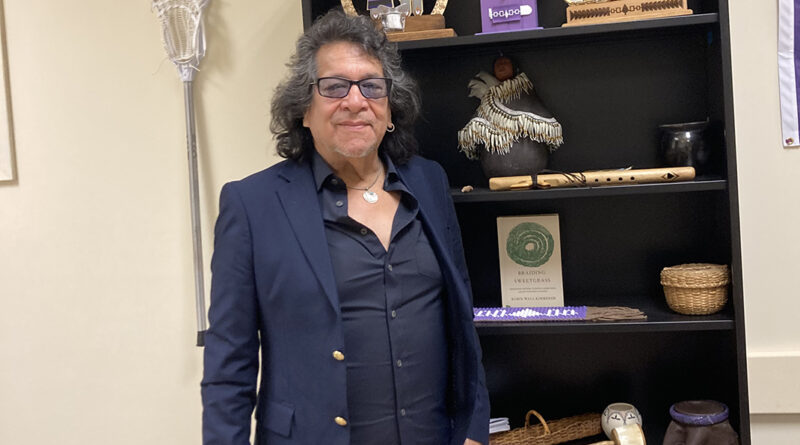LAST PAGE: Irv Lyons Jr., 68
By Mary Beth Roach
He had just retired from the MOST when he learned of a new position at Onondaga Community College — Native/Indigenous admissions coordinator. He applied for it and started in January. He also developed the Indigenous Student Center on campus and is the front man for the local band, The Ripcords.
Q: This is a new program here at OCC and it’s a new role for you. How did this all come about?
A: It came about through OCC wanting to do a land acknowledgement — that OCC was on Onondaga ancestral lands. They wanted to honor and acknowledge that presence. They want to build the Native population here, so they’re going to need a Native — a Haudenosaunee, which I am. I’m Oneida Wolf Clan. You have to have a Haudenosaunee because people know that you know their customs and socialization. When you have an opportunity to work for your people, to use your skills to work for your people, I had to do it. The music helps because that’s another bridge that connects to the youth. The first thing that I had to do was create a center or headquarters for our Native students to go where they would feel comfortable, where they could engage with each other, they could study, they could relax. I brought all my things that were Native, so you walk in there, you know that that it’s Native, but it’s open to any student.
Q: You’re going to have a festival here on campus on Aug. 9. What will that involve?
A: Over 45 artists and crafters; we have three new fashion shows. Our Native fashion, our fashion designers are trending. We have a smoke dance competition, Native music, Native foods.
Q: What is your connection to the Nation?
A: I grew up on the Onondaga Nation. I’m Oneida, but I grew up on the Onondaga Nation. So that’s where my roots are, that’s where my friends and family are. That’s where I feel home is; that’s where I feel connected to.
Q: What do you see as the purpose of the center and the program?
A: To me, it is a light. It’s the Center for Natives. It’s a wheel for the Natives and the spokes that are in that wheel are socialization, culture, teaching, education, encouragement, art, bridge building, connecting. That center means a lot because everyone has to have a place to go. We have a lot of Native students that come from Canada, from Wisconsin. Because they’re far away, this is important to them. There’re a lot of cultural differences that people don’t realize that Native students experience. Part of my job is to help them navigate through the challenges that they might have.
Q: How was the response that so far back to the program, to the center?
A: We definitely are increasing Native registration here. The staff, the faculty, the kids are very receptive to it. Everything is evolving.
Q: What does this position mean to you personally?
A: Personally, it means an opportunity to change, to build bridges. I think that’s what the Creator sent me to do, more than music or more than anything else, to build bridges. I don’t speak my language, but I speak English. And the Creator has used my abilities to build bridges with the non-Native community and that’s the most important thing for me. The one thing that always drives me is our Great Law and it says in every deliberation we must consider the impact of the Seventh Generation, which means what I do on a micro level, whatever we do on a macro level as a government, as a people — how is it going to affect our children, their children, their children and next? Are we going to leave them with a brighter day, with a better environment, with a better effect toward each other?

